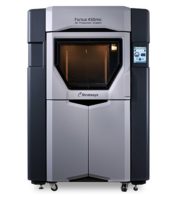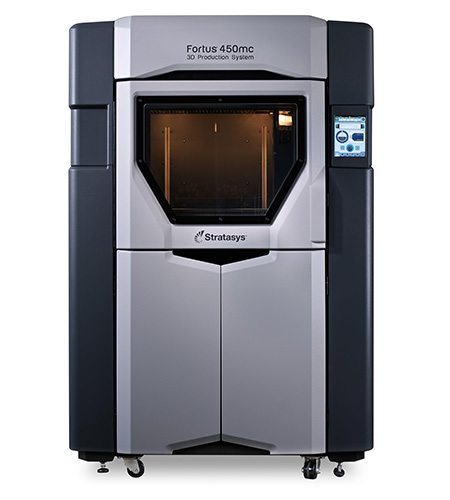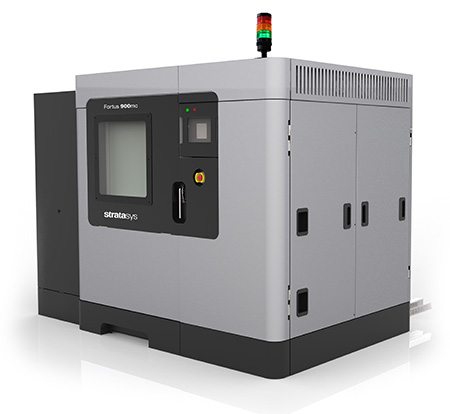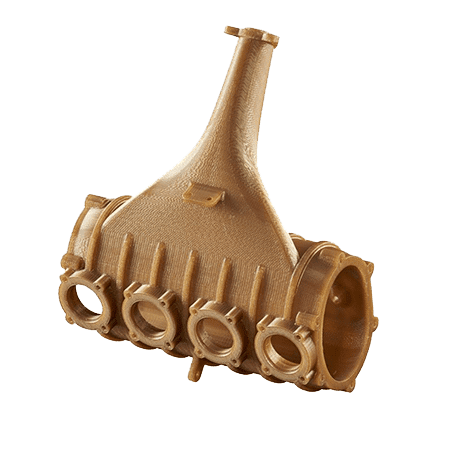
3D Printing for Strong & Stable Parts
ULTEM 1010 offers the highest heat resistance, chemical resistance and tensile strength of any FDM thermoplastic and is certified for food contact and bio-compatibility.
Overview
ULTEM 1010’s robust properties make it an ideal FDM printing material for advanced tooling and prototyping applications in spaces like automotive, aerospace, medical, and food-production. The certified grade of this material is bio-compatible and approved for food contact with NSF 51 and ISO 10993/USP Class VI certifications. Easily produce large custom tools for metal, plastic, or composite part fabrication as well as medical tools such as surgical guides that can withstand steam autoclaving. Print with confidence as ULTEM 1010 boasts one of the best resistances in additive manufacturing.
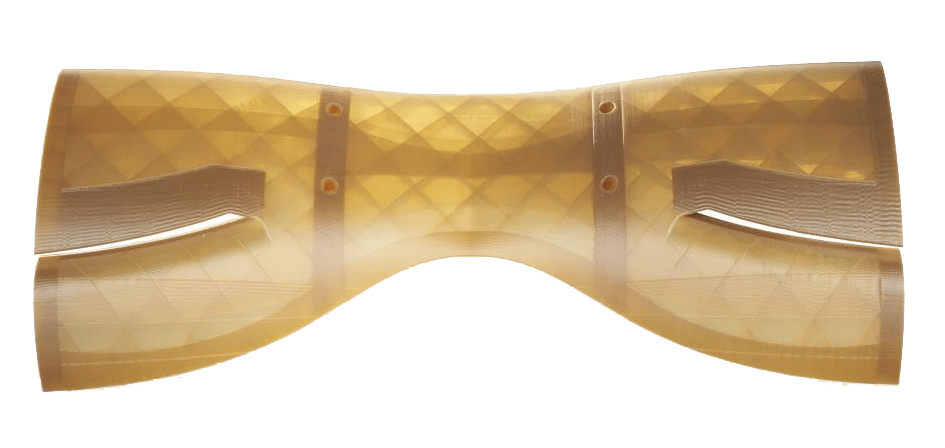
Material Performance
ULTEM 1010 resin offers the highest heat resistance, chemical resistance and tensile strength of any FDM thermoplastic. The certified grade of this material is biocompatible and approved for food contact with NSF 51 and ISO 10993/USP Class VI certifications.

IZOD IMPACT,
NOTCHED
41 J/m XZ axis

Heat Deflection
Temperature
216°C

Flexural
Strength
144 MPa XZ axis
77 MPa ZX axis

Tensile
Strength
64 MPa XZ axis
42 MPa ZX axis
Material Highlights
Characteristics
- Highest heat deflection of any FDM material
- Highest tensile strength of any FDM material
- Durable
- Dimensionally stable
Options
- NSF 51 Certified (food contact)
- ISO 10993/USP Class VI Certified (biocompatibility)
- Favorable FST (flame, smoke, toxicity) rating
Uses
- Custom tools for metal, plastic or composite parts fabrication
- Medical tools like surgical guides that can withstand steam autoclaving
- Heat-resistant dies, patterns and fixtures for food production
- Aerospace components
- Automotive parts including housings, ducts and semi-structural components
Advantages
- Bio-compatibility
- Food-contact safety
- Thermal stability to withstand autoclaving
Performance Scale
![]()
![]()
![]()
![]()
Material Colours

Technical Specifications
| Mechanical Properties | Test Method | English XZ Axis | English ZX Axis | Metric XZ Axis | Metric ZX Axis |
| Tensile Strength, Yield (Type 1, 0.125”, 0.2”/min) | ASTM D638 | 9,300 psi | 6,100 psi | 64 MPa | 42 MPa |
| Tensile Strength, Ultimate (Type 1, 0.125”, 0.2”/min) | ASTM D638 | 11,700 psi | 5,400 psi | 81 MPa | 37 MPa |
| Tensile Modulus (Type 1, 0.125”, 0.2”/min) | ASTM D638 | 402,000 psi | 322,000 psi | 2,770 MPa | 2,200 MPa |
| Tensile Elongation at Break (Type 1, 0.125”, 0.2”/min) | ASTM D638 | 53.3% | 2.0% | 3.3% | 2.0% |
| Tensile Elongation at Yield (Type 1, 0.125”, 0.2”/min) | ASTM D638 | 2.2% | 1.5% | 2.2% | 1.5% |
| Flexural Strength (Method 1, 0.05”/min) | ASTM D790 | 21,000 psi | 11,100 psi | 144 MPa | 77 MPa |
| Flexural Modulus (Method 1, 0.05”/min) | ASTM D790 | 409,000 psi | 324,000 psi | 2,820 MPa | 2,230 MPa |
| Flexural Strain at Break (Method 1, 0.05”/min) | ASTM D790 | No Break | 3.5% | No Break | 3.5% |
| IZOD Impact, notched (Method A, 23°C) | ASTM D256 | 0.8 ft-lb/in | 0.4 ft-lb/in | 41 J/m | 24 J/m |
| IZOD Impact, un-notched (Method A, 23°C) | ASTM D256 | 6.1 ft-lb/in | 2.6 ft-lb/in | 326 J/m | 138 J/m |
| Compressive Strength, Yield (Method 1, 0.05”/min) | ASTM D695 | 19,500 psi | 15,100 psi | 134 MPa | 107 MPa |
| Compressive Strength, Ultimate (Method 1, 0.05”/min) | ASTM D695 | No Break | 15,500 psi | No Break | 1,125 MPa |
| Compressive Modulus (Method 1, 0.05”/min) | ASTM D695 | 1,450,000 psi | 305,000 psi | 10,000 MPa | 1,120 MPa |
| Thermal Properties | Test Method | English | Metric |
| Heat Deflection (HDT) @ 66 psi, 0.125” unannealed | ASTM D648 | 421°F | 216°C |
| Heat Deflection (HDT) @ 264 psi, 0.125” unannealed | ASTM D648 | 415°F | 213°C |
| Vicat Softening Temperature (Rate B/50) | ASTM D1525 | 416°F | 214°C |
| Glass Transition Temperature (Tg) | DSC (SSYS) | 419°F | 215°C |
| Coefficient of Thermal Expansion | ASTM E831 | 26×10-06 in/(in·°F) | 47 µm/(m·°C) |
| Coefficient of Thermal Expansion (xflow) | ASTM E831 | 25×10-06 in/(in·°F) | 41 µm/(m·°C) |
| Melting Point | — | NA | NA |
| Electrical Properties | Test Method | Value Range |
| Volume Resistivity | ASTM D257 | 1.0 x1014 – 8.96×1015 ohm-cm |
| Dielectric Constant | ASTM D150-98 | 2.67 |
| Dissipation Factor | ASTM D150-98 | .001 |
| Dielectric Strength | ASTM D149-09, Method A | 240 V/mil |
| Other | Test Method | Value |
| Specific Gravity | ASTM D792 | 1.27 |
| Flame Classification | UL 94 | V0 (1.5 mm), V0, 5VA (3 mm) |
| Rockwell Hardness | ASTM D785 | 109 |
| Oxygen Index | ASTM D2863 | 0.44 |
| OSU Total Heat Release (2 min test, . 060” thick) | FAR 25.853 | 35.7 kW min/m2 |
| Vertical Burn | FAR 25.853 (Test a (60s), passes at) | 4 seconds |
| UL File Number | — | E345258 |
| Burn Testing | ||
| Total Mass Loss (TML) | ASTM E595 | 0.41% (1.00% maximum) |
| Collected Volatile Condensable Material (CVCM) |
ASTM E595 | -0.1% (0.10% maximum) |
| Water Vapor Recovered (WVR) | ASTM E595 | -0.37% (report) |
| Fungus Resistance (Method 508.6) | MIL-STD-810G | Passed |
| Burn Testing | ||
| Horizontal Burn (15 sec) | 14 CFR/FAR 25.853 | Passed (0.060” thick) |
| Vertical Burn (60 sec) | 14 CFR/FAR 25.853 | Passed (0.060” thick) |
| Vertical Burn (12 sec) | 14 CFR/FAR 25.853 | Passed (0.060” thick) |
| 45° Ignition | 14 CFR/FAR 25.853 | Passed (0.060” thick) |
| Heat Release | 14 CFR/FAR 25.853 | Passed (0.060” thick) |
| NBS Smoke Density (flaming) | ASTM F814/E662 | Passed (0.060” thick) |
| NBS Smoke Density (non-flaming) | ASTM F814/E662 | Passed (0.060” thick) |
